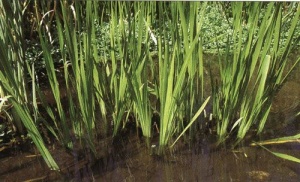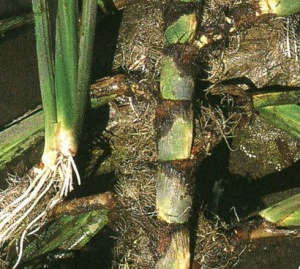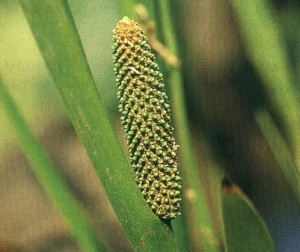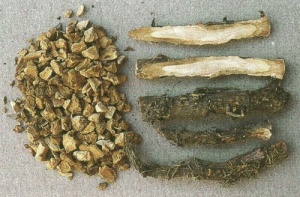Difference between revisions of "Kaburo"
Jump to navigation
Jump to search
| (7 intermediate revisions by 2 users not shown) | |||
| Line 38: | Line 38: | ||
;Kelabit | ;Kelabit | ||
| − | :'Kaburo' inah adhah [[nibu|sibu]] | + | :- 'Kaburo' inah adhah [[nibu|sibu]] |
| − | :[[Uat]] nuk [[pangah]] [[pidang]] tuen [[nutuk]], [[ngelamud]] ruyung | + | :- [[Uat]] nuk [[pangah]] [[pidang]] tuen [[nutuk]], [[ngelamud]] ruyung ebpaq. Ebpaq dih [[mirup|rupen]], koh [[tabat]] [[ngetep|etep]] [[selangui]], mey [[lemaii]] |
| − | :[[Baney]] 'kaburo' pakai [[ta'ut|meta'ut]] [[ | + | :- [[Baney]] 'kaburo' pakai [[ta'ut|meta'ut]] [[adaq]]. Da'at adaq ngan [[buen]] dih. |
| + | :- inan 'aserone' dingih | ||
;English | ;English | ||
| − | :'Kaburo' is cultivated [[#References|<sup>1</sup>]] | + | :- 'Kaburo' is cultivated [[#References|<sup>(1)</sup>]] |
| − | :The dried rhizome is pounded, mixed with water and drunk as an antidote to snake bites, and as a cure for diarrhoea.[[#References|<sup>1</sup>]] | + | :- The dried rhizome is pounded, mixed with water and drunk as an antidote to snake bites, and as a cure for diarrhoea.[[#References|<sup>(1)</sup>]] |
| − | :Wearing a necklace of dried 'kaburo' is believed to scare away malevolent spirits because of the smell.[[#References|<sup>1</sup>]] | + | :- Wearing a necklace of dried 'kaburo' is believed to scare away malevolent spirits because of the smell. [[#References|<sup>(1)</sup>]] |
| + | :- Contains [[Wikipedia:asarone|asarone]][[#References|<sup>(2)</sup>]] | ||
;Malay | ;Malay | ||
| − | : | + | :- 'Kaburo' adalah sejenis tanaman. |
| + | :- Akar yang telah dikeringkan ditumbuk dan dicampur dengan air sebelum diminum untuk menyembuhkan gigitan ular dan cirit birit. | ||
| + | :- Adalah dipercayai bahawa bau akar 'kaburo' kering yang dipakai sebagai rantai boleh menjauhkan roh-roh jahat. | ||
| + | :- Mengandungi "asarone". | ||
==References== | ==References== | ||
#[[Wikipedia:Ethnobotany|Ethnobotany]] of the Iban & Kelabit by Hanne Christensen | #[[Wikipedia:Ethnobotany|Ethnobotany]] of the Iban & Kelabit by Hanne Christensen | ||
| − | + | #[[Wikipedia:Sweet Flag]] | |
<!---NOTES on categories---> | <!---NOTES on categories---> | ||
<!---Please change letter category D in the example to the first letter of the word UPPERCASE. | <!---Please change letter category D in the example to the first letter of the word UPPERCASE. | ||
Latest revision as of 14:52, 31 January 2008
Contents
Pronounciation
?
Alternative spellings
- Keburo
Translations
- Part of speech
- noun
- English
- Sweet flag
- Malay
- ?
Derived Terms
- n/a
Encyclopedic info
- Scientific name
- Acorus calamus
- Kelabit
- - 'Kaburo' inah adhah sibu
- - Uat nuk pangah pidang tuen nutuk, ngelamud ruyung ebpaq. Ebpaq dih rupen, koh tabat etep selangui, mey lemaii
- - Baney 'kaburo' pakai meta'ut adaq. Da'at adaq ngan buen dih.
- - inan 'aserone' dingih
- English
- - 'Kaburo' is cultivated (1)
- - The dried rhizome is pounded, mixed with water and drunk as an antidote to snake bites, and as a cure for diarrhoea.(1)
- - Wearing a necklace of dried 'kaburo' is believed to scare away malevolent spirits because of the smell. (1)
- - Contains asarone(2)
- Malay
- - 'Kaburo' adalah sejenis tanaman.
- - Akar yang telah dikeringkan ditumbuk dan dicampur dengan air sebelum diminum untuk menyembuhkan gigitan ular dan cirit birit.
- - Adalah dipercayai bahawa bau akar 'kaburo' kering yang dipakai sebagai rantai boleh menjauhkan roh-roh jahat.
- - Mengandungi "asarone".
References
- Ethnobotany of the Iban & Kelabit by Hanne Christensen
- Wikipedia:Sweet Flag



